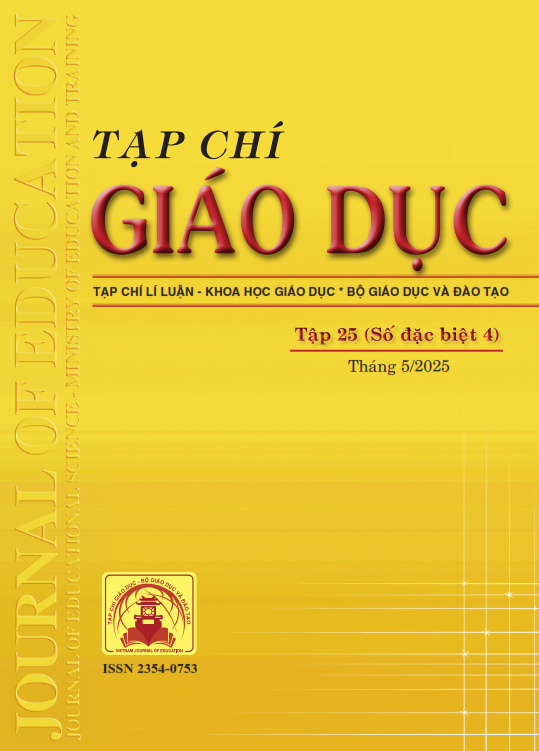Sự hài lòng nghề nghiệp của giáo viên Việt Nam: Nghiên cứu theo các yếu tố nhân khẩu học
Tóm tắt
Teachers' job satisfaction has received increasing attention from the scientific community and policy makers, aiming to address the issue of teacher retention - a global challenge in the current context. This study was conducted to analyze the level of job satisfaction of Vietnamese teachers and examine the relationship between demographic factors and their job satisfaction. The study was conducted on 1,205 teachers from preschool to high school and vocational education and continuing education centers nationwide. The results showed that the level of job satisfaction of Vietnamese teachers is at an average level; 5 factors showed statistically significant differences in the level of satisfaction, including geographic region, level, grade, school type, and class size. Correlation analysis showed that all demographic factors had weak correlations with job satisfaction. Some policy recommendations are made in light of the research findings in order to enhance Vietnamese teachers' job satisfaction. The findings of the study provide a scientific basis for developing policies to improve the quality of teachers' professional life, thereby contributing to improving the quality of education and reducing the rate of teacher turnover in Vietnam.
Tài liệu tham khảo
Christensen, A. A., & Jerrim, J. (2025). Professional learning communities and teacher outcomes. A cross-national analysis. Teaching and Teacher Education, 156, 104920. https://doi.org/10.1016/j.tate.2024.104920
Dillard-Cooke, J. B., Mosley, K. C., McCarthy, C. J., & Awad, G. H. (2025). A student like me: Black student achievement moderates the relationship between teacher-student racial matching and the occupational wellbeing of Black teachers in the United States. Teaching and Teacher Education, 159, 105010. https://doi.org/10.1016/ j.tate.2025.105010
Erdem, C., & Koçyiğit, M. (2025). The interplay among school climate, instructional quality and teacher job satisfaction: Mediation of teacher motivation. International Journal of Educational Development, 114, 103231.
Feng, H., Zhang, M., Zhang, J., & Li, X. (2025). Development and psychometric evaluation of the Nursing Teacher Emotional Labor Scale. BMC Nursing, 24(1), 200. https://doi.org/10.1186/s12912-025-02832-4
Hackman, J. R., & Oldham, G. R. (1975). Development of the Job Diagnostic Survey. Journal of Applied Psychology, 60(2), 159-170. https://doi.org/10.1037/h0076546
Lawler, E. E., III, & Porter, L. W. (1967). The effect of performance on job satisfaction. Industrial Relations, 7(1), 20-28. https://doi.org/10.1111/j.1468-232X.1967.tb01060.x
Li, L., Kanchanapoom, K., Deeprasert, J., Duan, N., & Qi, Z. (2025). Unveiling the factors shaping teacher job performance: exploring the interplay of personality traits, perceived organizational support, self-efficacy, and job satisfaction. BMC Psychology, 13(1), 14. https://doi.org/10.1186/s40359-024-02324-1
Locke, E. A. (1976). The nature and causes of job satisfaction. In M. D. Dunnette (Ed.), Handbook of Industrial and Organizational Psychology (pp. 1297-1349). Chicago: Rand McNally.
Locke, E. A., & Latham, G. P. (1990). Work motivation and satisfaction: Light at the end of the tunnel. Psychological Science, 1(4), 240-246. https://doi.org/10.1111/j.1467-9280.1990.tb00207.x
Mosley, K. C., McCarthy, C. J., Lambert, R. G., & Caldwell, A. B. (2025). Understanding teacher professional intentions: the role of teacher psychological resources, appraisals, and job satisfaction. Social Psychology of Education, 28(1), 2. https://doi.org/10.1007/s11218-024-09981-5
Mullins, J. L. (2005). Management and organizational behavior (7th ed.). Pearson Education Limited.
Muñoz-Fernández, G. A., Toala-Mendoza, R. D., González-Mohíno, M., & Félix-López, M. E. (2025). Unveiling the nexus of teacher commitment and job satisfaction: insights from Ecuador's educational landscape. BMC Psychology, 13(1), 134. https://doi.org/10.1186/s40359-025-02471-z
Virgana, V., & Fitriani, A. (2025). Transformative leadership: cultivating teacher excellence through satisfaction, environment, and self-efficacy. Journal of Education and Learning, 19(2), 1065-1073. https://doi.org/ 10.11591/edulearn.v19i2.21837
Wu, M., Mohammadi, M., & Izadpanah, S. (2025). Investigating the Mediating Role of Job Commitment and Job Satisfaction in the Relationship Between Social Support and Job Motivation Among English Language Teachers. European Journal of Education, 60(2), e70069. https://doi.org/10.1111/ejed.70069
Yaakob, M. F. M., Habibi, A., Halili, S. H., Alqahtani, T. M., & Fauzee, M. S. O. (2025). Unveiling the role of organizational commitment on job satisfaction and job performance in Islamic education. International Journal of Evaluation and Research in Education, 14(2), 975-983. http://doi.org/10.11591/ijere.v14i2.31071
Yang, X., Pu, L., & Shen, S. (2025). Task performance, turnover intention, and their mechanisms in Chinese rural teachers. Social Behavior and Personality, 53(3), e14274. https://doi.org/10.2224/sbp.14274
Zhao, X., Byun, S., & Jeon, L. (2025). Professional commitment and satisfaction of teachers in head start within a systemically marginalized community: associations with perceived psychological distress and physical safety. Social Psychology of Education, 28(1), 55. https://doi.org/10.1007/s11218-025-10029-5
Đã Xuất bản
Cách trích dẫn
Số
Chuyên mục
Giấy phép

Tác phẩm này được cấp phép theo Ghi nhận tác giả của Creative Commons Giấy phép quốc tế 4.0 .












